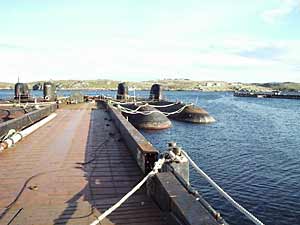
New Managing Director for Bellona Norway
The Board of the Bellona Foundation has appointed former Minister of Climate and the Environment Sveinung Rotevatn as Managing Director of Bellona No...
News

Publish date: January 8, 2003
Written by: Charles Digges
News
The resumption represents a welcome thaw between the two governments on the issue of cleaning up Russia’s dangerously corroding decommissioned subs — an issue that has been hampered by mutual distrust since Moscow’s security structures levelled espionage charges against now-jailed military journalist Grigory Pasko, whose reports on nuclear waste management in the Russian Pacific Fleet awakened Tokyo’s fears.
–>
The programme, which was frozen last spring, has also been dogged by bureaucratic confusion in Moscow. But since the June announcement by the Group of Eight industrialized nations to contribute $20bn over the next ten years to Russia’s disarmament efforts, Putin has committed more energy to consolidating the efforts of the involved government ministries.
Tokyo has earmarked some $168m for the Japan-Russia Committee for Cooperation in Reducing Nuclear Weapons toward containing threats of nuclear contamination in the Sea of Japan. The most serious of these threats is the 41 rusting submarines that have been decommissioned by the Russian navy, but continue to remain perilously afloat at dockside with their nuclear fuel still aboard.
Many of these subs were slated for destruction with Japanese funding in 1999, but Russia’s concerns with secrecy eroded Moscow’s commitment to the project. As a result, Japan froze its funding.
But Moscow’s recent promises to establish a governmental oversight body — headed by Prime Minister Mikhail Kasyanov — to coordinate Russia’s decommissioning efforts have led Tokyo to release its funding, government sources told Japan’s Asahi Shimbun newspaper on Saturday.
The Japan-Russia Committee will also establish a new strategy department to strengthen the fund’s auditing procedures, as well as to fortify its authority to ask Russia to disclose information. If the committee fails to meet its goals within five years, the sources told the paper, it will be dissolved.
Russia has long sought to suppress discussion of its Navy’s difficulties in safely dismantling its growing collection of decommissioned submarines. But something approaching openness was achieved over the summer when Russia’s Atomic Energy Ministry, or Minatom, convened an international conference dedicated to the problems associated with decommissioning efforts in the Pacific Fleet.
According to Valery Akhunov, head of Minatom’s ecology and decommissioning department, Russia plans to destroy 131 submarines throughout the navy by 2010. Akhunov has estimated that it will cost $3.9bn to meet that task. But last year, Moscow budgeted just $70m toward improving nuclear safety throughout the country.
Decommissioning efforts at the Zvezda plant at the Bolshoi Kamen base, near Vladivostok, also hang in the balance. Since 1995, Zvezda has been kept afloat largely with American funding. The plant was given the responsibility for cutting up 22 ballistic missile submarines that targeted the United States.
But later this year, the last of these subs will be dismantled, which threatens to leave the plant in the lurch. Russian and Japanese officials, however, say that the remaining tactical and general purpose subs that are awaiting dismantlement constitute no less a security and environmental threat.
This was underscored in recent years when two decommissioned subs sank off the coast of northeastern Kamchatka — one in 1997, the other in 1999. They were quickly raised and the navy claims no harm was done, but they remain an object of concern.
In this sense, the new funding from Japan should breathe new wind into Zveda’s sails as the most likely spot to do away with these remaining submarines.
One of the most pressing task toward doing this, Akhunov has said, is the construction of a storage base for 19 reactor compartments that are now floating in Razboinik Bay near Bolshoi Kamen.
Because Russia has no onshore storage facility for storing decommissioned submarine reactors, the current practice is to slice three compartment sections out of submarines — the reactor compartment in the middle with two compartments on either side to provide buoyancy. The three compartments, which are welded together by steel sheets, are stored afloat.
Construction of the storage facility, which will cost an estimated $70m, is scheduled to begin this year. Russia is also seeking $18m to build a long-term storage structure for two submarines whose reactors were damaged in accidents and emit high radiation. These two subs are kept afloat with pontoons near Bolshoi Kamen.

The Board of the Bellona Foundation has appointed former Minister of Climate and the Environment Sveinung Rotevatn as Managing Director of Bellona No...

Økokrim, Norway’s authority for investigating and prosecuting economic and environmental crime, has imposed a record fine on Equinor following a comp...

Our op-ed originally appeared in The Moscow Times. For more than three decades, Russia has been burdened with the remains of the Soviet ...

The United Nation’s COP30 global climate negotiations in Belém, Brazil ended this weekend with a watered-down resolution that failed to halt deforest...